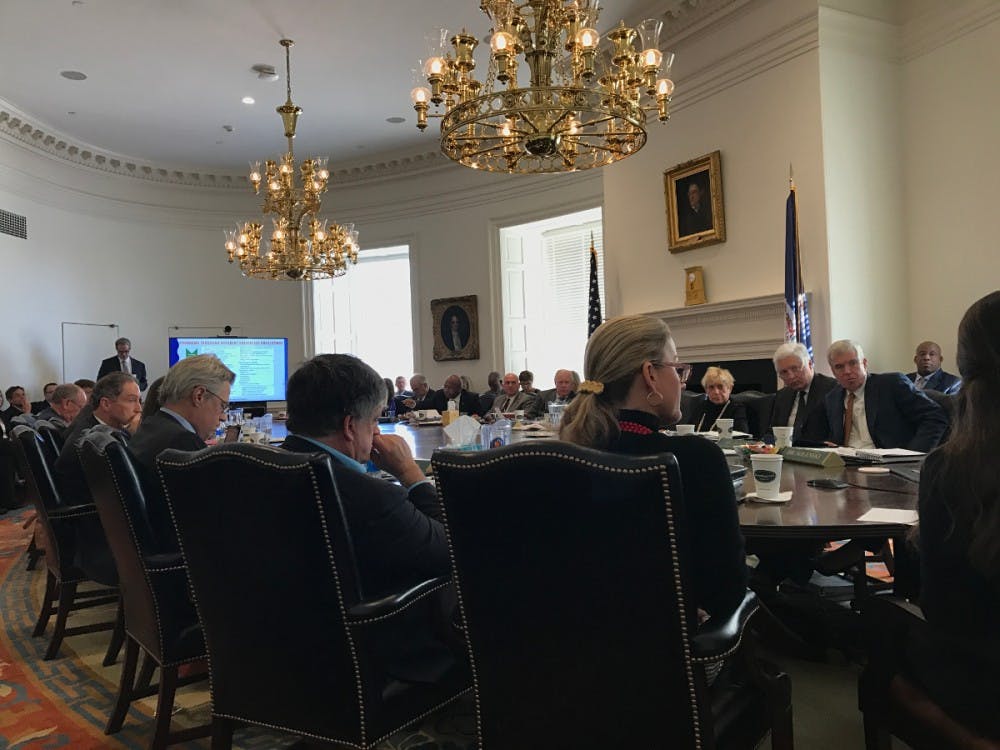The Board of Visitors’ Academic and Student Life Committee met Friday to discuss a potential increase in future enrollment, alcohol training and awareness and competitive performance in the ACC.
Archie Holmes, University vice provost for academic affairs, led the discussion on a proposal to increase enrollment by 100 in-state students in the 2017-18 school year.
Holmes outlined the five guiding principles for University Academic Affairs, including making undergraduate education accessible and affordable to all, providing adequate University infrastructure to support students and reflecting diversity in the academic community.
Prior to the committee meeting, University President Teresa Sullivan told The Cavalier Daily that the plan would come at an estimated cost of $1.6 million, noting that the University spends more on in-state students than it receives from them.
“This will be the first time I propose an expansion without asking that the [state] legislature fund it,” Sullivan said.
Rector William Goodwin Jr. clarified that the state did not specifically request the board increase University enrollment in total, but some state authorities are calling for the University to take fewer out-of-state students and more in-state students.
Holmes presented two theoretical examples for increased in-state enrollment — enrolling 100 new transfer students or 100 first-time in-residence students, although he noted that integration into University life can be more difficult for transfer students and can impact their academics.
Holmes commented on the importance of providing University housing for all incoming first-year students, meaning that increased first-year enrollment would require more on-Grounds housing options.
Committee member Jeffrey Walker recommended the University take note of other top university efforts to effectively increase enrollment. He cited creative opportunities for students to complete their first semester at the University abroad or delay enrollment until January to meet housing needs.
Student Board member Phoebe Willis, a Law and Darden graduate student, said current University students are describing long wait times for dining, counseling and advising services. Willis also noted that since student activity fees have been increasing, the board should assess these issues in considering increased enrollment.
Holmes recommended enrollment decisions not be publicized during application season because it may impact future applicant pools.
The committee did not vote on the enrollment proposal and resolved to hear from Holmes at a later date.
Susan Davis, acting vice president of student Affairs, Chris Holstege, chief of U.Va. division of medical toxicology and executive director of Student Health, and Susan Bruce, director of the Gordie Center for Substance Abuse Prevention, spoke on University alcohol training and awareness efforts.
Holstege encouraged the committee to focus on acquired data when addressing alcohol related issues and highlighted University efforts to leverage a variety of resources, including student organizations, the medical and engineering schools and the Charlottesville community.
Bruce informed the committee there has been a steady decline in incoming first-year students who reported to have drank beer, liquor or wine in the previous year. The committee requested more data on how students are behaving once they arrive on Grounds to measure the impact of University culture on student drinking patterns.
Representatives from the Alcohol and Drug Abuse Prevention Team, Student Athlete Mentors and Hoos in Recovery spoke on behalf of their respective organizations. They were met with applause from the committee for their efforts.
Goodwin urged the committee to commit more time to discussing the issue of student alcohol abuse prevention in future meetings.
“It’s a big, big problem and I don’t think we’ve scratched the surface,” Goodwin said.
Committee members agreed to spark internal individual conversations with committee chair Barbara Fried and discussed the formation of a focus group on the topic.
Executive Associate Athletics Director Jon Oliver provided the committee with an academic and athletic performance summary.
This year’s student athletes have the highest average GPA in a survey going as far back as 2003, Oliver said.
Oliver emphasized the importance of hiring coaches committed to the University’s tradition of “uncompromised excellence.”
“This is an institution where you have to be committed academically,” Oliver said. “There are no light majors at the University of Virginia.”
At the beginning and end of each semester, two faculty members assess classes with “an abnormal amount of athletes” for athlete performance and rigor, Sullivan said to the committee.
The committee also approved seven new professorships in the Law and Medical Schools, as well as the Miller Center.







